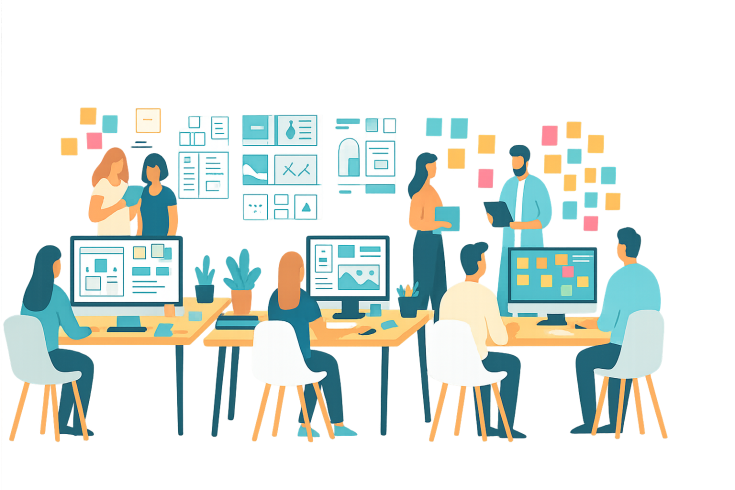Innovative CRM Solutions for Marketing, Types of CRM, and Expert CRM Specialists

What is a CRM System in Simple Terms and Why Every Business Needs One?

If you’re wondering what is a CRM system in simple terms, think of it as your businesss digital memory. Picture a tool that helps you remember names, preferences, and past interactions without needing to keep notes scattered across various platforms. A CRM (Customer Relationship Management) system organizes your customer data in one place, making it easier for you to build better relationships and boost sales.
How Does CRM Work for Your Business?
Imagine Sarah, the owner of a local bakery. Before investing in a CRM system, she struggled to remember her regular customers’ orders. Some would casually mention their birthday, and she might forget by the next time they visited. But with her new CRM, each customer’s preferences and special dates are stored and can be accessed at a glance. This not only impresses her customers but also drives repeat business. ⭐
Why Do You Need a CRM System?
- Organization: Keep customer information neatly organized. ⭐️
- Personalization: Tailor your communications based on customer history. ⭐
- Efficiency: Save time with better internal workflows and automation. ⏰
- Insights: Gain valuable insights into your customer base and business trends. ⭐
Real-World Marketing Examples of CRM Systems
One familiar marketing example is how large retailers like Amazon use CRMs to recommend products based on past purchases. Emily, an avid book reader, often finds herself receiving suggestions for similar titles just because Amazon remembers her previous selections. This understanding of customer needs not only keeps her shopping but also builds loyalty. By leveraging the power of a CRM, businesses can significantly enhance their marketing strategies by recognizing patterns in sales and customer behavior.
What Do CRM Specialists Do?
CRM specialists manage and configure these systems to tailor them to the specific needs of a business. They ensure that data flows seamlessly and assist in training staff on how to use the software effectively. For example, a CRM specialist might help a tech startup streamline their customer outreach by implementing automated email responses. This saves time and ensures no lead is ever forgotten. ⭐
Investment in a CRM System is an Investment in Your Business
Implementing a CRM can sound daunting, but consider this: businesses that effectively use CRMs can increase their revenues by up to 41% per salesperson, according to studies. When you think about it, investing €6000 in a CRM system development might seem high initially, but that could translate to hundreds of thousands in increased revenue over time. ⭐
Understanding the Different Types of CRM Systems
What types of CRM are there? There are many, but fundamentally they fall into three categories:
- Operational CRM: Focuses on streamlining customer interactions and process automation.
- Analytical CRM: Focuses on analyzing customer data collected from various sources to enhance business strategies.
- Collaborative CRM: Focuses on sharing customer information across teams or departments to improve customer service and satisfaction.
Let’s put this into context: Suppose you run a real estate agency. Your operational CRM collects information from clients seeking homes, while your analytical CRM helps you analyze market trends and sales data to better position properties. At the same time, a collaborative approach can ensure that all agents are in sync with recent client interactions, making customer service more fluid. ⭐
Final Thoughts
By now, it’s clear that a CRM system isnt just a luxury—its a vital component for any business aiming for growth. Whether you’re running a bakery like Sarah or a tech startup, putting a CRM in place can pave the way for improved relationships and increased profits. Don’t wait! Transform your customer management today by contacting Nexrilo’s expert team. Call us at [email protected] or visit nexrilo.com to learn more about our services and get started!
Frequently Asked Questions
- What is a CRM system? It is a software that helps businesses manage customer relationships by storing and analyzing customer data.
- How does CRM improve sales? By providing insights into customer behavior, allowing for targeted marketing and better customer service.
- Can small businesses use CRM? Absolutely! CRMs come in various sizes and can be beneficial for businesses of any size.
- What features should I look for in a CRM? Look for usability, integration with other tools, mobile access, and analytics capabilities.
- Is CRM expensive? Costs vary based on the features and number of users, but often, the ROI justifies the investment.
- What is the difference between CRM and ERP? CRM focuses on customer interactions, while ERP manages business processes across departments.
- Can CRM systems integrate with other software? Most modern CRMs offer integration with various tools such as email marketing and project management software.
- How often should I update my CRM system? Regularly review and update information to ensure accuracy and relevance.
- Do I need a specific CRM model for my industry? While many CRMs are versatile, some models offer specialized features tailored for specific industries.
- What are the best practices for using a CRM? Stay consistent in entering data, train your team regularly, and analyze the data for informed decisions.
What Types of CRM are There? Exploring Varied Approaches with Real-World Marketing Examples

When you dive into the world of Customer Relationship Management, you’ll realize that not all CRM systems are created equal. Just like different businesses have unique needs, there are various types of CRMs tailored to suit those requirements. Lets explore these types and uncover how they can transform your organization.
1. Operational CRM: The Backbone of Customer Interactions
Operational CRM is all about streamlining your customer-facing processes. Imagine you run a restaurant. An operational CRM can help manage everything from reservations to customer orders. With this system, waitstaff can access past orders instantly, personalize the dining experience, and even send follow-up emails thanking patrons for their visit. ⭐
Take, for instance, a pizza shop in your neighborhood. Using an operational CRM, they can easily identify regulars, their favorite pizzas, and any specific requests theyve made in the past. This leads not only to improved service but also to higher customer satisfaction and repeat visits.
2. Analytical CRM: Data at Your Fingertips
As the name suggests, analytical CRMs focus on analyzing data gathered from various customer touchpoints. Picture yourself as a marketing manager at an e-commerce site. You need to understand which products are popular, who your customers are, and how they found you. An analytical CRM digs deep into sales history, customer demographics, and campaign performances, giving you insights that drive your marketing strategies. ⭐
For example, let’s say you notice that a specific segment of your customers frequently buys fitness-related products. Armed with this knowledge, you can tailor your marketing efforts, perhaps by promoting a new line of gym equipment or sending out personalized emails with discounts on fitness apparel.
3. Collaborative CRM: Creating a Unified Customer Experience
In an ideal world, every department in your business would have access to the same customer information to provide a seamless experience. That’s where collaborative CRMs shine. They break down silos between departments—be it sales, marketing, or customer service—allowing for open communication and information sharing. ⭐
Consider a technology solutions company. If their sales team knows what information the customer service representatives have shared with clients, they can tailor their pitches more effectively. For instance, if a customer previously contacted support about an issue, the sales team can acknowledge that in their correspondence, showing care and attentiveness.
4. Campaign Management CRM: Targeted Marketing at Its Best
This type of CRM focuses on managing and analyzing marketing campaigns. Let’s say a coffee roaster decides to launch a new product—lets use a pumpkin spice blend, for example. With a campaign management CRM, they can keep track of which promotional emails go out, how they perform, and who responds. ☕
They also might segment their audience to send tailored offers, leading to increased engagement and sales. By measuring success through analytics provided by their CRM, they can continually fine-tune their approach for even better results in future campaigns.
5. Customer Service CRM: Elevating Support to New Heights
Customer service CRMs are all about enhancing the post-purchase experience. Imagine a subscription box company that regularly delivers unique products to its customers. They use a customer service CRM to track inquiries, complaints, and feedback. ⭐️
With this CRM, they can identify common issues that customers face, leading to improved products and services. For instance, if many customers report dissatisfaction with a particular item in their box, the company can promptly rectify the situation, enhancing customer trust and loyalty.
Real-World Marketing Examples of CRM Implementation
To bring this all together, let’s take a look at some real-world examples:
- Operational CRM Example: Starbucks uses operational CRMs to enhance customer engagement through their loyalty program. Each purchase earns points that can be redeemed for free products, tailored to each customers preferences.
- Analytical CRM Example: Netflix leverages analytical CRMs to track viewing habits. This helps them create tailored recommendations, boosting viewer retention and satisfaction.
- Collaborative CRM Example: HubSpot encourages collaboration between marketing and sales teams. By sharing insights from both departments, they improve customer engagement and increase conversion rates.
- Campaign Management CRM Example: Mailchimp allows businesses to run targeted email marketing campaigns, track open rates, and adjust their tactics based on customer interaction with previous emails.
- Customer Service CRM Example: Zappos provides stellar customer service by using their CRM to keep track of customer interactions, ensuring they resolve issues efficiently and create lasting connections.
Conclusion
Understanding the different types of CRMs can profoundly impact how you interact with customers, streamline processes, and ultimately grow your business. Whether you need an operational CRM to manage daily transactions or an analytical CRM to derive insights from customer behavior, choosing the right system can elevate your customer relationships to new heights. ⭐
Get Started Today!
Are you ready to implement a CRM system for your business? Contact Nexrilo at [email protected] or visit us at nexrilo.com to discover how we can help you choose the best CRM solution tailored for your needs!
Fill out the form below and our team will reach out within one business day
